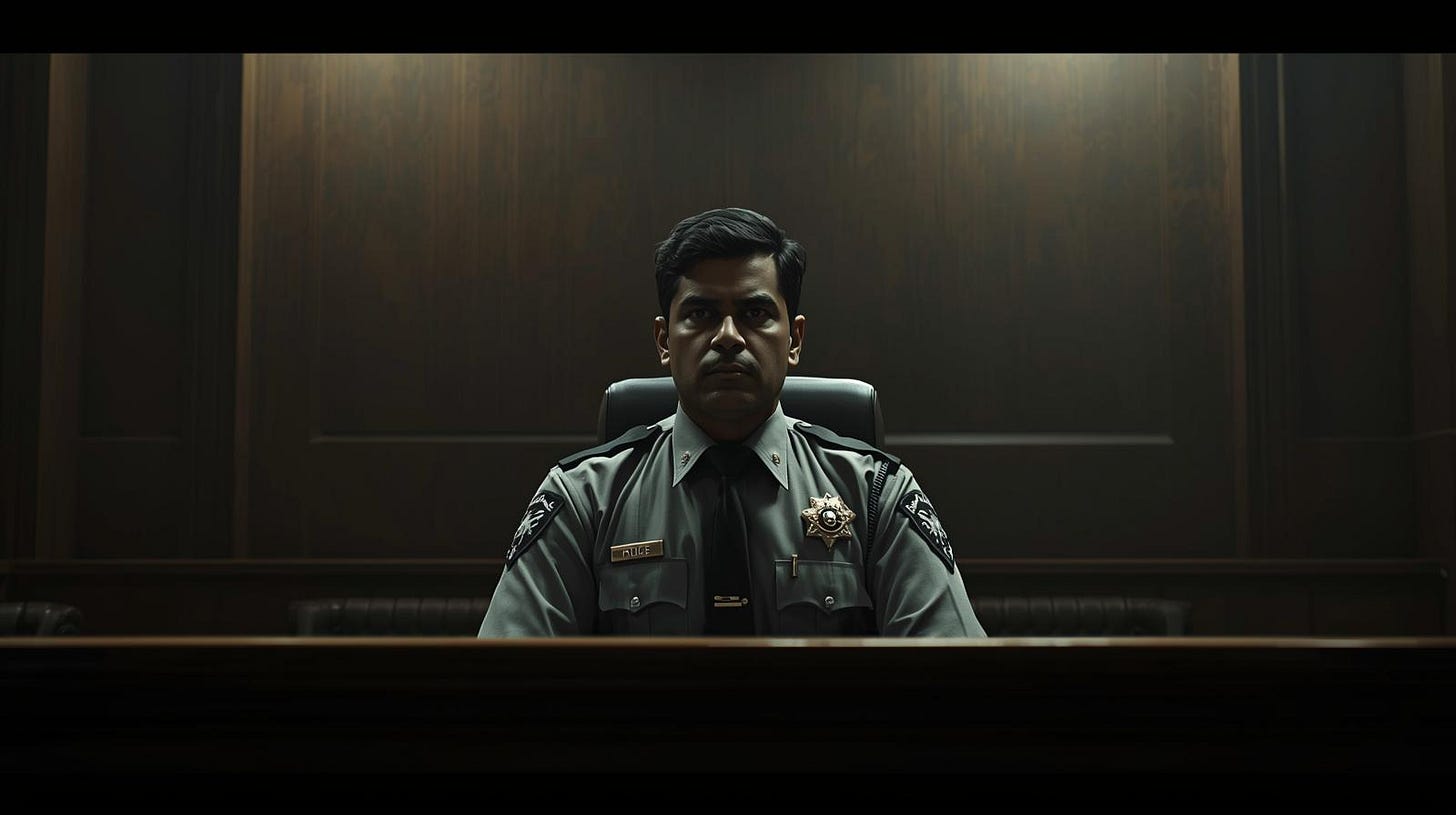The Cheaters, the Hackers, and the Honest Cops: A Call for Law Enforcement Self-Correction
What two recent scandals say about character, culture, and the need for ethical reform in public safety leadership
Please don’t think less of me. I briefly wondered what was the big deal over the Hillsborough County (Florida) Sheriff’s Office cheating scandal. I felt that those involved losing their careers was enough, but being added to a veracity disclosure list for a non-criminal violation was punitive.
When Cheating Becomes a Credibility Crisis
The first domino to fall was Chief Deputy Anthony Collins, the second in command. He and Mrs. Collins reached a degree of marital disharmony where she, in a retaliatory move, revealed via email to the elected sheriff that the chief deputy had paid a tutor to complete his coursework for the FBI National Academy (FBI-NA). The FBI-NA is a ten-week program for senior law enforcement leaders. In the 90 years of the program, more than 55,000 law enforcement managers and executives have graduated the program. It is currently held at the FBI Training Academy in Quantico, Virginia. The academy has certainly earned its prestige as I have seen many friends attend and return filled with drive and purpose, then progress to even higher offices. If it earns criticism, it should be regarding its exceptionally low rate of failure. In other words, cheaters would cheat out of laziness, not a lack of academic capability.
I have been a guest of the Hillsborough County Sheriff’s Office and toured many of their facilities and was briefed of their intelligence and analytical capacity. They showed their main offices, the jail, their substations and more subtle installations. Today, based on my impressions years ago, I stand by the assessment that the Hillsborough County Sheriff’s Office is a top tier modern law enforcement agency ready to embrace every technological advancement that furthers the mission of ensuring safe communities.
The scandal grew as the investigation probed deeper. Data analysis of emails found other agency commanders using the same ‘tutor’ as Chief Deputy Collins. Five additional ranking members either resigned or were terminated between July and October of this year under the cloud of cheating at their leadership schools by having papers ghostwritten. They lost their jobs, or as Sheriff Chronister put it, “They paid with their careers” but then they were Brady listed. Given the fact that they had such a public fall from grace, as well as it was unlikely that they were going to be conducting investigations or making arrests, seemed like overkill. Today, after consideration, I do support that action, and recent Kansas City, Kansas, Police Department case makes the Hillsborough actions make even more sense.
The Hidden Cost of Secrecy and the Brady–Giglio Divide
On November 3, 2025, Wired magazine published the secrets scandal of the Kansas City (KS) police hack. In 2024, a malicious group of hackers who are known by the name Blacksuit literally held the information systems of KCKPD hostage and demanded a ransom to return control of the data. The city refused to pay.
“Published by the transparency nonprofit Distributed Denial of Secrets, more than 1 terabyte of hacked documents paint a disturbing picture: Officers with egregious credibility issues—those the department itself investigated and found untrustworthy—were not only allowed to stay on the force but often rose through the ranks or moved on to other departments, without the public knowing. In Kansas City, Kansas, the police department asserts that Giglio Lists are not subject to disclosure, as they considered confidential personnel records.”
Brady and Giglio, are based on U.S. Supreme Court decisions in 1963 and 1972 respectively. They form the foundation of prosecutors’ obligations in discovery to supply known exculpatory evidence (Brady) and any witness credibility issues (Giglio.) In Florida and several other states, the term “Brady list” is often used as a catch-all, but most officers placed on it are there for Giglio issues, for credibility or integrity concerns that could affect their testimony. Failure to disclose is a violation of the defendant’s right to due process under the Fourteenth Amendment.
This hack has caused reputational harm for every great cop with the KCKPD. The data revealed cops who would steal from crooks on raids, egregious examples of domestic violence and workplace sexual harassment, proven excessive force and false arrests. Officers who should have been fired or criminally charged, faced neither with some promoted to the highest ranks. This further undermines criminal cases and complicates the work of the prosecutors who have no idea that officers they are putting on the stand shouldn’t even have a badge anymore.
Integrity Is the Real Reform
These cases tell us that there is more cheating and dishonesty waiting to be discovered. I’m certain prior to July, all these Hillsborough deputies were anticipating their next promotion. It is nearly certain that there are other worse secrets hidden behind weak firewalls just waiting to be hacked. This presents a real leadership opportunity for the entire first responder community to have the conversation with staff, based on these examples, that nothing hidden can be assured to remain hidden. This applies to personnel records, discipline files and training certificates. It is likely time for an audit, especially by a qualified third party to find any blind spots.
Researching this article, the same memory kept recurring. In 2003, my fitness instructor, then Officer Steve Kelley, held large workout classes during lunch hour. Many participants would shave a few reps from our exercises, and I reached out to see if he recalled the quote he shared with me back then.
“My dad always said — anything worth having is worth working for. Those who avoid the work only cheat themselves and set themselves up for failure (or injury)!”
(In his third career, he serves as Director of Law Enforcement and Safety Team Training, at Decision Tactical in Central Florida, the most immersive tactical training center, open to the public, on the planet. Check out their video in the references.) It was so impactful to remember his perspective about the cruel joke when cheaters cheat themselves.
The entire public safety realm, including law enforcement, corrections, and fire-rescue, demand respect from the public based on our integrity. Cases like these undermine trust and claims of transparency, and worse, the stain impacts the hardest working and most virtuous among us. We can’t miss this opportunity for self-correction and real reform.
Please keep all first responders in your prayers.
Roland Clee served a major Florida police department as a Community Service Officer for more than 26 years. His career included uniformed patrol, training, media relations, intelligence, criminal investigations, and chief’s staff. He writes the American Peace Officer newsletter, speaks at public safety, recruiting and leadership conferences and helps local governments and public safety agencies through his business, CommandStaffConsulting.com.
For media interviews and podcast appearances, click here: http://bit.ly/40pT3NS
References
https://www.wired.com/story/hack-exposes-kansas-city-kansas-polices-secret-misconduct-list/
https://decisiontactical.com?v=0b3b97fa6688





Great article and very well spoken about the two issues that prosecutors have in some sort of check and balance on law-enforcement. My entire writing platform and philosophy is based on the idea of “courageous nobility“, which as you know, is faith-driven, and viciously assertive towards integrity and character. Without that you have nothing.
Take away for a minute the fact that these are law-enforcement officers, and even more indicting law-enforcement “leaders“, and look at the utter failure on what our society uses as a metric for success. These people decided to cheat and to get through a school that people who legitimately would benefit and thrive graduating from our waiting in the wings due to nepotistic and unscrupulous behavior. Just to get a yellow brick and a monthly newsletter to show off.
Please continue writing and espousing truth! I am with you!
Hey Roland, great article brother. this would not have occurred if we were "Leading Ourselves Well". Removal and Brady listed for an administrative failure of truth and accountability seems unjust on the surface. Without completely knowing the environment they were operating in and what other variables were in place will never excuse the behavior but might explain it. The Sheriff himself has likely utilized the services of another to assist in achieving an academic grade or class paper.
This situation reminds me of the Broward Sheriffs Office case clearance scandal many years ago under Sheriff Ken Jenne, ( former federal inmate). The entire agency command was on board with increasing clearance rates on property crimes and had a method that they instructed detectives and supervisors on how to conduct master case clearances. ( This was done so the Sheriff could acquire more contract cities by proving to them they we , the sheriffs office was much better at solving crime than the department they currently had. A culture of fabrication was instilled in that agency, from the top to the bottom, why, because clearing cases wasn't a big deal, it was an administrative tool that was used to make your boss look good. ( Chief were also getting bonuses depending upon how well their districts performed that year with clearing cases. When the scandal broke, command got amnesia and blamed the entire mess on rogue deputies. They went after the deputies, fired them, pulled their certificates, ruined their lives. Not one person of rank received so much as a day suspension. ( Jenne actually paid a prominent law firm 300k to come up with a analysis proving no one else knew)
Im sorry for my very long winded response. Not condoning the action but it is quite clear to me that the organization has created this environment. They have made it not a big deal and simply a method to have the next box checked off. Id imagine if you look closer at that entire process you find a system of short cuts and cheats throughout. I'm not saying its right, it is unfortunately just how things are done. Admit it, that as a leader you have failed and then start the hard work of regaining self respect and trust of those that you lead. Thanks bud you got me all jacked up this am!!!